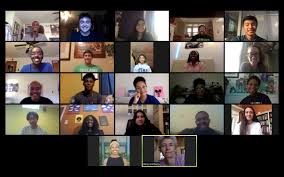Riya Mukherjee
The EA community has participated in the Springside Chestnut Hill (SCH) conference in mid-January, the Student Diversity Leadership Conference (SDLC) in December, and the faculty panel, an event aimed to increase faculty awareness about diversity struggles from the perspective of the students.

At diversity-related events, the student attendees have the ability to interact with other individuals of different communities, perspectives, experiences, and socioeconomic circumstances. Laura Patterson ‘21 says, “It’s an extremely easy way to meet other students and create bonds with people who share similar aspects of your identity or at least you’ll be able to build a community. Beside that, it also provides a place for you to learn from your peers and their experiences rather than in a typical academic setting. It really is a practice in growing your empathy.”
Although the recent SCH diversity conference this year was held through Zoom due to coronavirus restrictions, attendees were still able to engage with people of various backgrounds. Ashley Kim ‘23 explains, “We did a story exchange [about students’ backgrounds], there was a keynote speaker, and then we broke into social justice workshops which covered a wide range of topics.” Kim attended lectures on Asian-specific xenophobia and the glamorization of drug usage and euphoria. “I think that as an Asian-American specifically, it’s really valuable to have an affinity space where you can connect with people who have faced similar experiences as you, and [talking] about taboo topics helps you realize that you are not alone in all of the specific challenges that we face as a minority,” Kim says.
The faculty panel, around an hour in length, gave teachers, administrators, and faculty members the opportunity to listen to student’s experiences at EA. Jasmine Williams ‘22 describes, “The panel was basically a bunch of teachers asking me how I felt the school environment was and how we adapt as students of color.” She explains that it was “very interactive, but there were moments when teachers asked questions and I felt they were just there for their participation.”
Panel questions included: how does an administrator build trust in you, what does it feel like to be mis-gendered in a classroom, how can someone make up for doing that, and do you or how do you feel truly valued in our community? Despite concerns of disengagement, student speakers recognized that the teachers with cameras on seemed interested in their experiences and took notes to improve in their own disciplines.
For students interested in current diversity initiatives, clubs and organizations within the EA community include the Asian-American Student Union (AASU), Black Student Union (BSU), Diversity Awareness Club (DAC), Queer/Straight Alliance, and Hispanic Student Union (HSU). Kelly Leight-Bertucci, an Upper School Diversity, Equity, Inclusion (DEI) coordinator explains, “It’s important to go to groups that you may not identify with if they are at an open meeting because I think it’s important to show that you want to listen, learn, and show you’re an ally.”
As a result of the recommendations provided by a group of EA Alumni this past summer, Bertucci explains that EA is working to organize new initiatives. One of these actions is the addition of a three part anti-racist unit added into the Freshman Seminar program. Through discussions regarding the true definition of systemic oppression, the criminal justice system and mass incarceration, and giving students the opportunity to discuss potential improvement in their own communities, Bertucci notes that “it was really great to see students really engage with the material and ask thoughtful questions.”
Recent diversity efforts display the progress both EA and our broader communities have achieved while showing the room left for further improvement. Kim adds, “Change starts with people who are willing to step outside of their comfort zone and stand up for things that aren’t necessarily affecting them directly.”